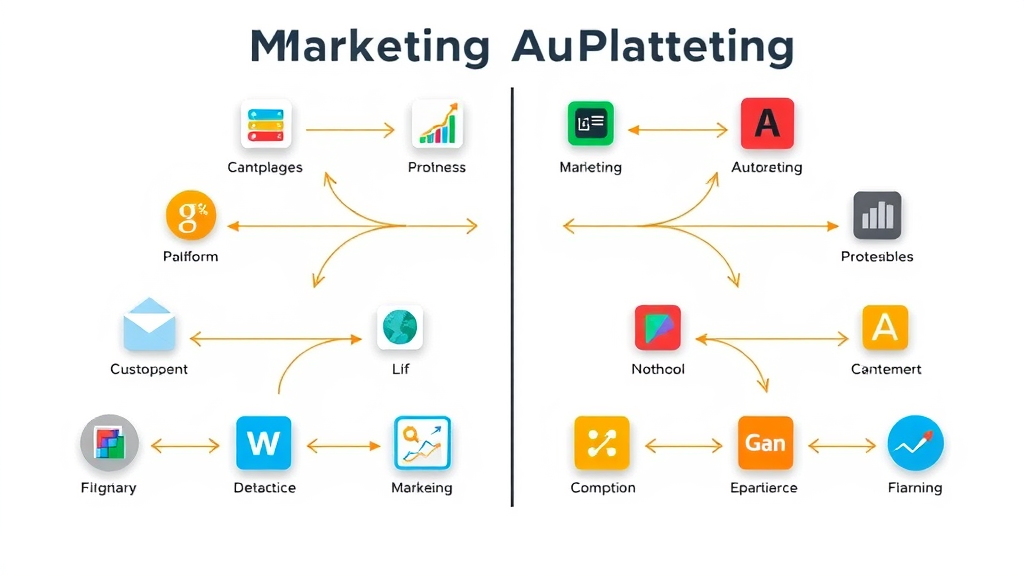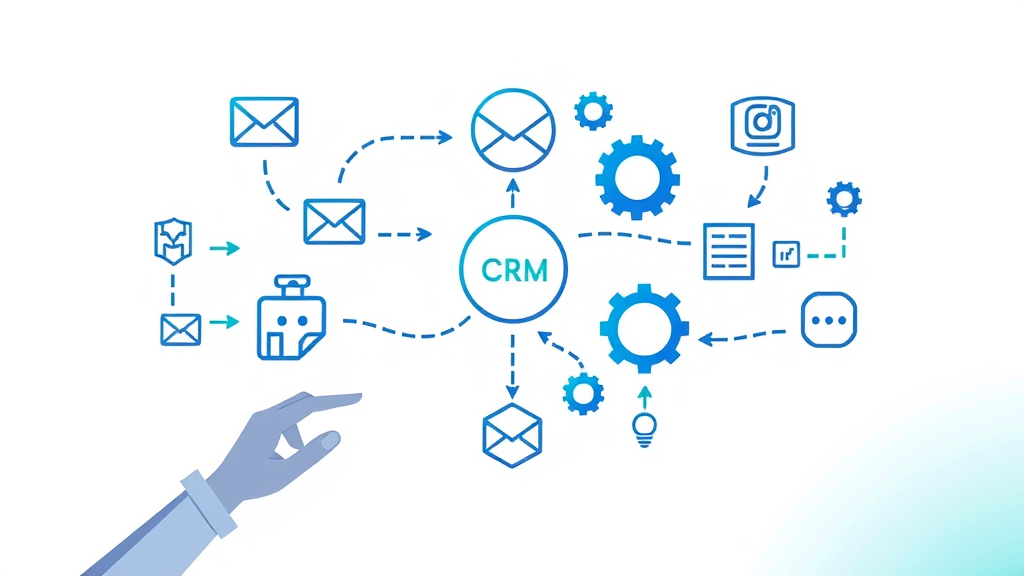Imagine this: Four out of five businesses report skyrocketing leads within months of adopting marketing automation tools, making these platforms not just a helpful addition but a sales necessity. Are you ready to discover how these automation solutions can transform your strategy, save time, and unlock new levels of sales growth? Let’s dive into the world of marketing automation and uncover the tools that can take your business to the next level—starting today.

Unlock Sales Growth with Marketing Automation Tools: Surprising Stats That Redefine Marketing Success
The race for sales growth is fiercer than ever, and more organizations are turning to marketing automation tools to stay ahead. One eye-opening fact: 80% of companies report increased lead generation after implementing automation software . This isn’t just a coincidence; it's a testament to how digital marketing automation platforms transform marketing campaigns, boost efficiency, and create deeper customer engagement across multiple channels. Whether you’re a small business or a large enterprise, leveraging the right automation tool is now critical for achieving instant and lasting sales lift.
Automation software not only helps teams save time, but also unlocks a competitive advantage through real-time insights and personalized experiences. As marketing tasks grow more complex and audiences demand faster, more relevant communications, choosing the right automation solution can mean the difference between watching your business grow—and watching competitors surge ahead. Explore real-world examples and essential stats as we reveal how automation tools convert potential into profit.
"Did you know that 80% of companies saw an increase in leads after implementing marketing automation tools?" – Industry Insights
How Marketing Automation Tools Transform Your Strategy
- Save time and resources with automation software
- Increase lead generation with targeted marketing campaigns
- Enhance customer engagement throughout the customer journey
- Streamline multi-channel marketing with advanced automation platform solutions
Marketing automation tools fundamentally change how businesses approach digital marketing by automating repetitive tasks, allowing your marketing team to focus on strategy and creativity. With automation software, time-consuming activities—like sending follow-up emails, managing social media schedules, and nurturing leads—become seamless processes executed with precision. As a result, marketing teams save time, reduce errors, and reach audiences more consistently across multiple channels.
The impacts reach further than just efficiency. Advanced automation platforms empower brands to build highly targeted marketing campaigns, segment audiences, and deliver content tailored to each stage of the customer journey. This hyper-personalization not only increases sales but also boosts customer satisfaction, leading to stronger relationships and higher retention rates. Businesses can analyze campaign performance, adjust strategies in real time, and deploy resources where they matter most—giving them a powerful edge in today’s competitive market.

What You'll Discover About Marketing Automation Tools
- How automation tools boost conversion rates and sales
- Key features of the best marketing automation software
- Tips for choosing the right automation platform for your business size and goals
- Practical examples from top marketing automation tool providers
By the end of this guide, you’ll know how to select, implement, and leverage marketing automation software that fits your unique needs. We’ll break down game-changing platform features, help you match automation solutions to your business’s size and customer journey, and supply actionable advice using real-world marketing campaign examples from leading providers. Our focus—arming you with the knowledge and tools to instantly boost sales and deliver personalized experiences your customers crave.
Whether you're new to marketing automation or seeking to upgrade your current solution, understanding the specialized features and integrations of each automation platform is crucial. Let’s jump in and compare the top players dominating today’s digital marketing landscape.
Comprehensive Guide to Marketing Automation Tools: Features, Benefits, and Platforms

Comparing Marketing Automation Platforms: Key Features at a Glance
| Tool Name | Automation Features | Best For | Pricing Tier | Integrations |
|---|---|---|---|---|
| HubSpot | Email marketing automation, workflows, lead nurturing | All sizes | $$$ | CRM, Ecommerce, Social Media |
| ActiveCampaign | SMS, email, marketing campaign automation | SMB | $$ | CRM, CMS, Social Media |
| Marketo | Advanced automation platform, multi-channel campaigns | Enterprise | $$$$ | CRM, Analytics |
| Mailchimp | Email marketing, customer journey, segmentation | SMB | $ | Ecommerce, Analytics |
| Pardot | B2B marketing automation tool, lead management | B2B | $$$ | Salesforce, CRM |
Each marketing automation platform offers unique strengths, making it essential for businesses to compare essential features. While HubSpot excels as an all-in-one automation solution for every business size, Marketo stands out for handling complex, multi-channel marketing campaigns at the enterprise level. Small and mid-sized businesses (SMBs) often prefer Mailchimp and ActiveCampaign due to their affordable pricing and simplified workflows. Pardot, on the other hand, is a top choice for B2B lead generation and management.
When evaluating marketing automation software , always consider your primary goals: Do you need robust CRM integration? Are analytics crucial for optimizing campaigns? What about workflow flexibility or multi-channel capabilities? Selecting the right automation tool ensures long-term scalability and a greater return on your technology investment.
Advantages of Using Marketing Automation Software
- Automate repetitive tasks with automation software
- Personalize customer experience using behavioral data
- Streamline multi-channel marketing campaigns
- Monitor analytics to refine marketing automation strategy
Marketing automation tools dramatically save time by eliminating the need for manual execution of repetitive tasks like sending emails, sorting contacts, or updating campaign statuses. This efficiency empowers sales teams and marketing teams alike, helping them allocate more time for strategy and creative planning rather than busywork.
In addition to time-savings, marketing automation software leverages customer data and behavioral analytics to deliver truly personalized experiences. Whether you’re targeting segments within larger audiences or individualizing messages for each contact, automation tools deliver relevant content, offers, and touchpoints throughout the customer journey. This data-driven approach leads to better campaign performance, higher open rates, and improved conversion rates for your business.

Best Practices for Leveraging Marketing Automation Tools
- Segment audiences for targeted marketing campaigns
- Use email marketing automation for nurturing leads
- Integrate CRM with automation tool for unified workflows
- Continuously test and optimize automation software performance
To maximize results with a marketing automation tool, start with audience segmentation—breaking your contacts into manageable, relevant groups based on behaviors, demographics, or purchase history. This step is key for building effective marketing campaigns that drive higher engagement and conversion. Next, implement email marketing automation to nurture prospects with personalized content, moving them through their unique buying journeys.
Integrating your CRM with your automation platform unifies customer data, giving both sales teams and marketing teams a comprehensive view of every interaction. Finally, adopt a culture of continuous testing—analyzing campaign performance, A/B testing workflows, and adjusting content based on analytics. The businesses that constantly refine their automation software see the best improvements in campaign ROI and customer satisfaction.
Top Marketing Automation Platforms for Different Business Needs
Best All-in-One Marketing Automation Platform Solutions
- HubSpot: Marketing, sales, CRM, and customer engagement in one automation platform
- ActiveCampaign: Comprehensive automation tool for SMBs
- Marketo: Scalable and customizable marketing automation platform
Selecting the right marketing automation platform depends on your goals, team size, and budget. HubSpot is lauded for its all-in-one approach, seamlessly combining email marketing, CRM, customer engagement, and marketing automation in a single package. This makes it ideal for growing companies needing scalability and integration. ActiveCampaign targets SMBs with advanced automations and intuitive workflows, while Marketo remains an enterprise favorite for its deep customization, advanced analytics, and support for complex, multi-channel marketing strategies.
When considering an automation solution, factor in how well the platform integrates with your existing stack, its learning curve, and the support offered. The leading platforms—HubSpot, ActiveCampaign, and Marketo—make sure your business has the flexibility to scale, test, and optimize all marketing tasks on the road to long-term sales growth.

Automation Tools for Email Marketing Success
- Mailchimp for streamlined email marketing automation
- Sendinblue: Affordable, powerful marketing automation software for growing lists
- ActiveCampaign: Advanced workflows and customer journey mapping
Email remains a cornerstone of digital marketing, and the right automation tool can supercharge your campaigns. Mailchimp stands out for its intuitive interface and powerful automation workflows, perfect for SMBs looking to automate their customer communications with ease. Sendinblue offers a cost-effective platform for sending personalized emails, managing segmentation, and integrating SMS marketing. ActiveCampaign provides complex customer journey mapping and advanced triggers to ensure every message is timely and relevant.
With email marketing automation, you drive consistent customer engagement, nurture prospects efficiently, and create compelling experiences that convert subscribers into loyal customers. These automation solutions also tap into analytics, helping you measure open rates, click-throughs, and campaign ROI with remarkable clarity.

Social Media Marketing Automation Tools
- Hootsuite: Automate social media posting and engagement
- Buffer: Plan and schedule marketing campaigns on leading social networks
- Sprout Social: Comprehensive insights and campaign automation
Social media is dynamic, fast-paced, and demands consistency. That’s where automation tools like Hootsuite , Buffer , and Sprout Social come into play—making it simple to schedule, monitor, and engage with audiences across Facebook, Twitter, LinkedIn, and more. Social media marketing automation ensures you maintain a regular online presence, coordinate campaigns, and analyze audience responses, all from one platform.
Features like unified dashboards, content calendars, detailed insights, and automated publishing help your marketing team save time while maximizing customer engagement. These platforms empower businesses to reach target audiences when it matters most, increasing campaign effectiveness and enabling real-time feedback.
How Marketing Automation Tools Optimize the Customer Journey
Mapping the Perfect Customer Journey with Automation Software
- Identify customer touchpoints for personalized marketing campaigns
- Leverage analytics from marketing automation software to improve experience
- Design workflows that enhance customer engagement and retention
The modern customer journey spans multiple channels and touchpoints, making it more important than ever to deliver timely, personalized interactions. Marketing automation tools allow you to map each customer’s progression, delivering the right message at precisely the right time. From initial awareness through post-purchase nurturing, automation software brings clarity to what was once a chaotic marketing process.
By leveraging customer data and analytics, businesses design automation workflows that anticipate behavior and foster continuous customer engagement . The real magic happens when automated journeys adapt in real time—responding to clicks, site visits, or previous purchases to make sure every interaction feels unique and relevant. This fosters higher retention rates and turns one-time buyers into repeat brand advocates.

"Marketing automation platforms help businesses deliver the right message at the right time, every time." – MarketingProfs
Boosting Lead Generation and Conversion with Marketing Automation Tools
- Capture leads using landing pages built with automation software
- Automate lead nurturing workflows to move prospects through the funnel
- Monitor user behavior to trigger personalized marketing campaigns
- Improve sales team efficiency by syncing automation tool data with CRM systems
Effective lead generation is the heartbeat of every successful business, and marketing automation tools streamline this process like never before. Through integrated landing pages and smart forms, automation software captures user data and instantly routes leads to the relevant sales team members. Automated lead nurturing campaigns then engage prospects with targeted content, ensuring no opportunity slips through the cracks.
These tools monitor user behavior—tracking email opens, website visits, and engagement across social media—to automatically trigger the next best marketing campaign or sales action. What’s more, syncing automation tool data with your CRM provides your sales teams with a 360-degree view of every customer’s journey, helping them prioritize leads that are ready to convert, close deals faster, and ultimately drive greater revenue.

Selecting the Right Marketing Automation Tool for Your Organization
Criteria for Evaluating Automation Platforms
- Ease of use and onboarding
- Integration capabilities with existing automation tools
- Pricing models and scalability of marketing automation software
- Support and training resources
With dozens of marketing automation platforms on the market, pinpointing the perfect solution can feel overwhelming. Focus first on ease of use—choose a platform your team can learn quickly and deploy with minimal downtime. Next, assess integration capabilities. Your automation tool should seamlessly mesh with existing systems like CRM, email, and analytics. Pricing and scalability matter too; pick an option that grows as you do, without hefty upgrade fees or steep learning curves.
Lastly, evaluate the support ecosystem. Top marketing automation software providers offer training, live support, and vibrant communities to help your team master new features and troubleshoot issues. A platform’s true value lies not only in its features but in how reliably it supports your business ambitions, day in and day out.
Top Considerations for Enterprise vs. SMB Marketing Automation Solutions
- Enterprise: Advanced customization, analytics, and support
- SMB: Simplicity, affordability, and essential features
The needs of enterprises versus SMBs differ dramatically when choosing a marketing automation solution . Enterprises often demand highly customizable workflows, advanced analytics, and round-the-clock support to manage volume and complexity. They are drawn to platforms like Marketo and Pardot that deliver these power features. In contrast, SMBs seek easy onboarding, straightforward pricing, and all the must-have tools (like email marketing, landing pages, and CRM integration) in one place. Solutions like HubSpot and ActiveCampaign are frequently the go-to for smaller, nimble teams.
Consider your technical resources, sales pipeline size, and marketing process complexity before investing. The right automation platform will help your business achieve rapid adoption, maximizing ROI while scaling with you as goals evolve.
Watch:Integrating Marketing Automation Tools with Email Marketing, Social Media, and CRM
Key Integrations that Supercharge Automation Platforms
- Email marketing automation: Trigger emails based on user actions
- Social media integration: Schedule content and track engagement automatically
- CRM connection: Align sales, support, and marketing for a unified customer experience
Integration is the secret weapon for unlocking the full potential of any marketing automation platform. Seamlessly tying together email marketing automation , social media, and CRM systems creates a unified workflow, ensuring that all customer data flows effortlessly between sales, marketing, and support functions. Automation software with robust integration abilities can instantly trigger campaigns, respond to behaviors, and deliver a personalized experience to every contact.
For example, a user who abandons their cart can automatically receive retargeted emails or social media ads, while their profile is instantly updated in the CRM for the sales team to follow up. These connections enable tighter collaboration, minimize data entry errors, and ensure that decision-makers have accurate, up-to-date insights to drive performance.

Overcoming Common Challenges with Marketing Automation Software
Top Pitfalls in Implementing Marketing Automation Platforms
- Choosing overly complex automation solution for team size
- Neglecting to align automation tool with clear marketing goals
- Failing to regularly review automation platform analytics and KPIs
Even the best automation tools can fall short when rolled out without proper planning. A common pitfall is opting for a platform brimming with features your team never uses, leading to confusion and wasted budget. Successful deployment starts with clear objectives—identify the marketing tasks you need to automate, the channels you want to cover, and the key performance indicators that matter most.
Ongoing success depends on monitoring analytics and periodically reviewing workflows to keep campaigns fresh and aligned with current business goals. Marketing automation software thrives when your team is engaged, trained, and continually optimizing the platform’s capabilities for best-in-class results.
Maximizing ROI from Your Marketing Automation Investment
- Track performance metrics in real time
- Continuously refine marketing campaigns and customer journeys
- Invest in team education on automation software best practices
The highest returns from marketing automation platforms come from real-time tracking and a steady commitment to optimization. Make it standard practice to review analytics dashboards frequently, adjusting campaigns and workflows based on what’s working and what isn’t. Your investment also goes further when your marketing teams and sales teams understand how to use automation software to its full potential—consider ongoing training and knowledge sharing a must.
When every part of your marketing process is synchronized and your technology is finely tuned, your business moves faster, creates more value, and stays ahead of the digital marketing curve.
"ROI from marketing automation tools directly correlates with the accuracy of your data and campaign segmentation." – DigitalMarketer
People Also Ask: Marketing Automation Tools
What is a marketing automation tool?
- A marketing automation tool is automation software designed to streamline, automate, and measure marketing tasks and workflows, so organizations increase efficiency and grow revenue faster.

What's the best marketing automation tool?
- The best marketing automation tool depends on your business needs, but top choices include HubSpot, ActiveCampaign, Marketo, Mailchimp, and Pardot—each excelling in automation platform capabilities and integrations.
Which tool is used for marketing automation?
- Tools commonly used for marketing automation include HubSpot, Marketo, ActiveCampaign, and Mailchimp, among others. Each offers unique automation software features tailored to various marketing campaign strategies.
What are some examples of automation tools?
- Examples of automation tools include Salesforce Pardot for B2B, Mailchimp for email marketing, Hootsuite for social media, and HubSpot as a comprehensive marketing automation platform.
Expert Tips for Maximizing the Power of Marketing Automation Tools
- Prioritize customer engagement over automation quantity
- Deeply integrate CRM and automation platform for a 360-degree customer view
- Automate personalized content for each stage of the customer journey
- Regularly audit data quality within your marketing automation software
- Test, analyze, and refine all automation tool workflows for ongoing improvements
Prioritizing customer engagement ensures your automation solution delivers meaningful, personalized experiences—not just more messages. Deep CRM integration gives marketing and sales teams complete visibility, allowing you to match content and campaigns to every stage of a customer’s journey. Regularly auditing your data quality keeps your automated campaigns relevant and accurate, while constant testing ensures your marketing automation tools adapt as your strategy evolves.
Video Insights:Frequently Asked Questions About Marketing Automation Tools
- How do marketing automation tools improve lead generation? Marketing automation tools streamline lead capture, automate follow-ups, and nurture prospects with personalized content—boosting conversions and delivering higher quality leads for your sales team.
- What is the difference between an automation tool and automation platform? An automation tool usually refers to software focused on a specific function (like email automation), while an automation platform offers a broader suite—integrating email, CRM, analytics, social media, and more for a unified marketing process.
- Can marketing automation software be used for B2B and B2C purposes? Absolutely! While some platforms specialize for B2B (like Pardot), most marketing automation software adapts to B2C, allowing for tailored workflows and campaigns to suit any audience or business model.
- Which marketing automation solution offers the most integrations? HubSpot, ActiveCampaign, and Marketo are all regarded for their wide range of integrations—connecting seamlessly with CRMs, ecommerce platforms, analytics tools, and more to power your complete marketing stack.
- How do you measure ROI from marketing automation campaigns? Track KPIs like open rates, click-throughs, conversions, and revenue metrics directly within your automation platform’s analytics dashboard. Real-time reporting helps optimize campaigns and maximize returns on every marketing action.
Ready to Accelerate Sales? Unlock the Full Potential of Marketing Automation Tools
- Ready to grow your business and connect with more customers? Book your free marketing strategy with our team today. Call: 314-560-4642 or visit: https://marketingconnectionsllc.com/get-in-touch
Take action now: Invest in the right marketing automation platform and empower your marketing team to achieve measurable, repeatable sales growth—starting today.
To enhance your understanding of marketing automation tools and their impact on sales, consider exploring the following resources:
-
“The 11 Best Marketing Automation Tools for 2025” : This article provides an in-depth analysis of top marketing automation platforms, detailing their features, benefits, and suitability for various business sizes. It’s an excellent resource for comparing tools like Eloqua, Zapier, and Brevo to determine which aligns best with your marketing objectives. ( digitalocean.com )
-
“Top 16 Best Marketing Automation Tools to Use in 2025” : This comprehensive guide reviews leading marketing automation tools, highlighting their unique selling points, pricing, and ideal use cases. It offers valuable insights into platforms such as Marketo and Pardot, assisting you in making informed decisions tailored to your business needs. ( touchpoint.com )
By delving into these resources, you’ll gain a clearer perspective on how marketing automation tools can streamline your campaigns, enhance customer engagement, and drive sales growth.
 Add Row
Add Row  Add
Add 






Write A Comment